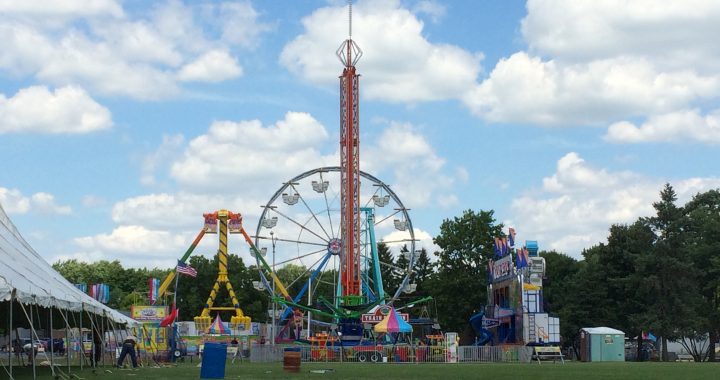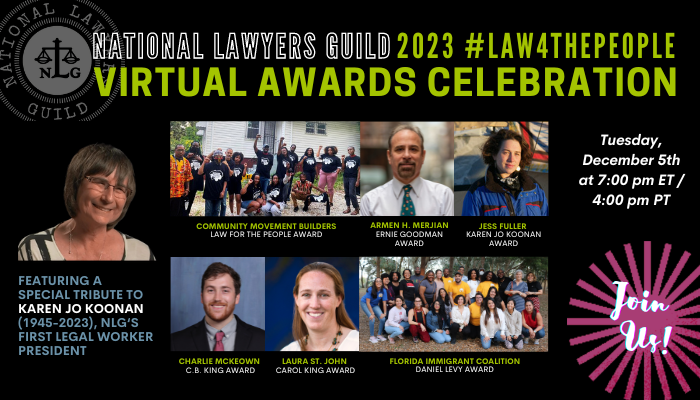By Martha Laura Garcia
Few things said summer like a good old county fair: the delicious smell of dangerously unhealthy food, kids laughing and shrieking to the tune of the carnival ride sounds, and the hope that maybe that year you’d win a giant stuffed animal in one of the games. As a kid, you got to stay up late with your friends and went on rides and over again until you made yourself sick. What’s not to love?
Flash-forward fifteen or so years:
I’m sitting on the only bench in a neighborhood park in a small town in northern Illinois with three co-workers. We’re trying to blend in with the crowd of workers with no luck. We’re the only women in the park and on top of that we’re dressed in jeans and simple t-shirts. Everyone else is wearing old work pants and a bright blue shirt with the carnival company’s logo on the front. We’re waiting for the workers to go on break, but even though it’s lunch time, they keep working. We get up to make our way back to our car. On the way, we walk past a ride that’s so tall and wide that we almost didn’t notice a smaller ride right behind it. There was one worker setting up the smaller ride and we saw an opportunity. We quickly glanced around to make sure the crew leader wasn’t around (we had seen him making rounds earlier) and we introduced ourselves. “Hello, we’re from a Chicago-based legal aid office that provides free legal services to workers like yourself,” said my co-worker in Spanish. The worker was startled and he hesitated to answer. “We know you’re working, sir. We only want to give you an informational card that you can look over later,” continued my co-worker. At this point, one of us slide a palm-sized card into his hand, which contained our number and general information about his rights and the cases we take. He semi-glanced at it before quickly dropping it into the pocket on his shirt and returning to work quickly as to go unnoticed.
This worker is one of the many H2-B foreign guest workers recruited to come to the U.S. every year to subsidize our low-wage economy. There are two major classifications: H2A which are workers who work in agriculture and H2B which are workers who work in any other temporary low-wage work, mostly in service industries like carnivals. They are hired in their home country where they are usually promised free housing, a good hourly rate for wages, and even the possibility of getting rehired in following years. However, the guest worker programs are highly flawed and high incidents of worker exploitation and human trafficking are reported each year. Many of these workers end up working for employers for less pay than they are promised, in unsafe or dangerous housing, and work conditions that are often inhuman, leaving the workers isolated and completely dependent upon the employer for food, transportation, and other basic needs.
LAF’s Immigrant and Workers’ Rights (IWR) Practice Group focuses a large part of its work on reaching out to low-wage workers and providing them with free legal assistance. Most of my work as an IWR intern was planning staff outreach trips to different parts of Illinois where I knew workers would be located and speaking to them about their legal rights and our services. Additionally, I also visited community partners that could collaborate with IWR to reach the workers, and visited local businesses that catered to these workers to drop off flyers, like grocery stores, money exchange locations, and even laundromats.
When I wasn’t in the field, I was at the office conducting phone intakes or follow up calls with workers we had previously visited. I spent a lot of time doing legal research of the issues these workers faced, such as the federal income tax requirements for foreign guest workers. Finally, I was also able to collaborate on a number of cases by drafting complaints to file in federal court, demand letters, and damage calculations. Most of the cases I worked on related to labor and employment issues, although I worked on a few immigration cases as well.
H-2A and H-2B workers are hired to do anything from farming to cooking; however, the carnival workers stuck out the most to me this summer. While I may always have fond memories of going to the country fair with my friends as a child, after witnessing work conditions and isolation that the workers are subjected to, I approach them with a much more critical and empathetic eye. Working with IWR has made me aware of the many challenges low-wage, migrant, and immigrant workers face and understand how life-changing the work of groups like IWR can be for these workers.




